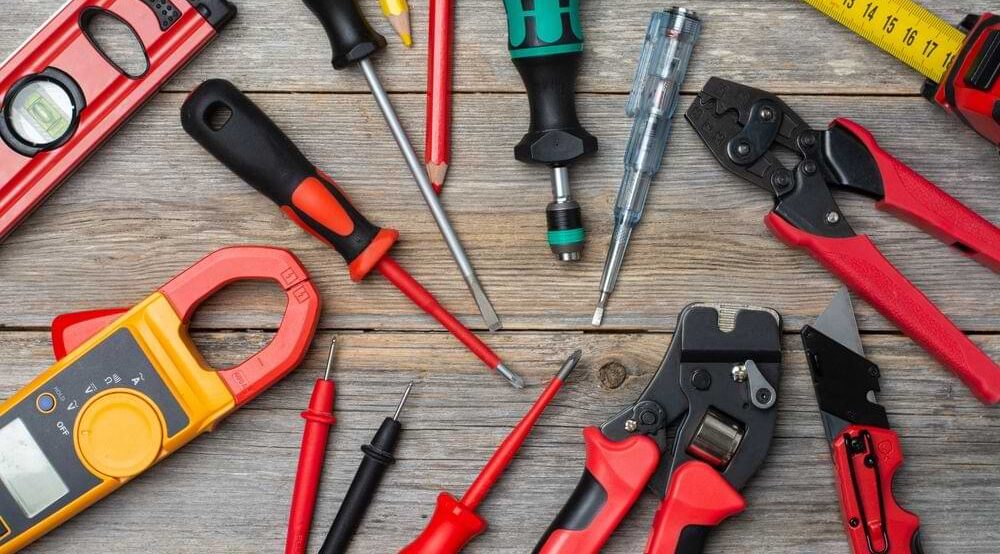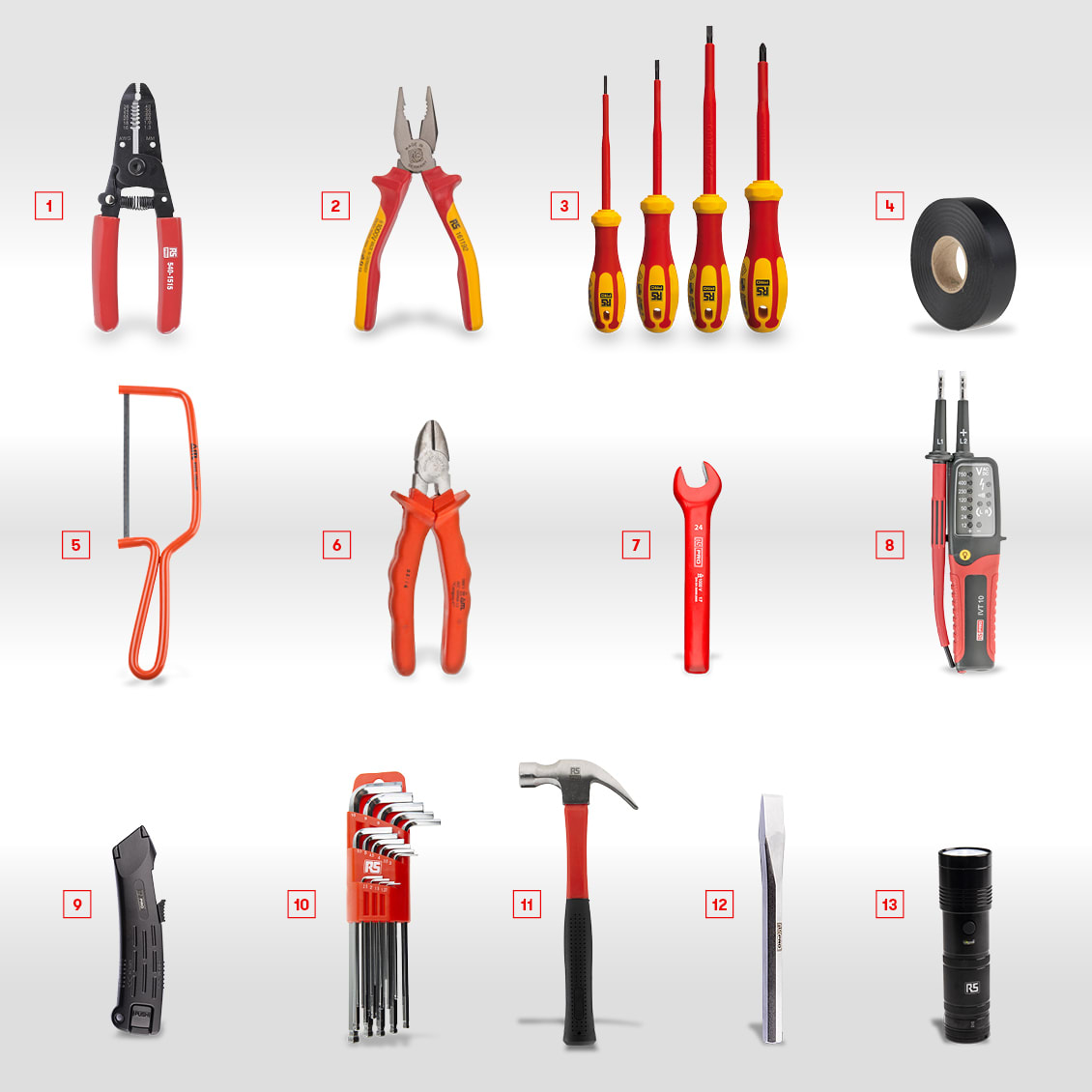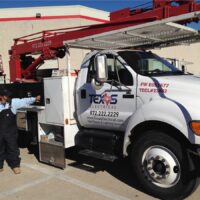Electricians use a variety of tools to ensure safety and efficiency in their work. Essential tools include pliers, wire strippers, and voltage testers.
Electricians rely on specialized tools to perform their tasks accurately and safely. Pliers and wire strippers help in handling and connecting wires, while voltage testers ensure circuits are de-energized before work begins. Screwdrivers, tape measures, and circuit finders are also crucial for various tasks.
Proper tools enhance work quality and safety, reducing the risk of electrical hazards. Investing in high-quality tools is essential for any electrician, whether a professional or a DIY enthusiast. Understanding and using the right tools can make all the difference in completing electrical projects efficiently and safely.
Introduction To Electrician’s Toolkit
Every electrician needs a reliable toolkit. A well-equipped toolkit is essential. It ensures efficiency and safety on the job. This section introduces the basic tools every electrician should have. It also covers the importance of tool quality and safety.
Essential Qualities Of Electrician’s Tools
Electrician’s tools must be durable. They should withstand daily use. High-quality tools make work easier. They also reduce the risk of accidents.
- Durability: Tools must handle tough conditions.
- Precision: Accurate tools ensure better work.
- Ergonomics: Comfortable tools prevent fatigue.
Choose tools from trusted brands. They often last longer and perform better. Investing in quality pays off in the long run.
Safety First: Insulated Tools And Gear
Safety is crucial for electricians. Insulated tools protect against electric shocks. Always use insulated screwdrivers, pliers, and cutters.
| Tool | Insulated Feature |
|---|---|
| Screwdrivers | Handles with insulation up to 1000V |
| Pliers | Insulated grips for safety |
| Cutters | Insulated for cutting live wires |
Wear safety gear always. This includes gloves and goggles. Non-conductive shoes are also important.
- Gloves: Protect hands from electric shocks.
- Goggles: Shield eyes from debris.
- Shoes: Non-conductive soles prevent grounding.
Regularly check your tools and gear. Replace damaged items immediately. Your safety depends on it.
Basic Hand Tools Every Electrician Needs
Electricians rely on specific hand tools to complete their tasks. These tools are essential for safety and efficiency. They make the job easier and quicker.
Pliers: Gripping And Twisting Wires
Pliers are crucial for electricians. They grip, twist, and cut wires. Electricians often use needle-nose pliers for their precision. These pliers have long, thin tips. They help reach tight spaces. Linesman pliers are also important. They have a robust build. They cut and twist thick wires easily.
Wire Strippers: Exposing Conductive Cores
Wire strippers are a must-have. They remove the insulation from electrical wires. This exposes the conductive core. Electricians need different sizes of wire strippers. Each size suits a specific wire gauge. This tool ensures clean and precise stripping. It prevents damage to the wire core.
Screwdrivers And Nut Drivers: Securing Components
Screwdrivers and nut drivers are indispensable. They secure electrical components. Electricians need various types of screwdrivers. These include flathead and Phillips. Each type fits different screws. Nut drivers are like screwdrivers. They tighten nuts and bolts. This tool ensures a secure connection.
| Tool | Primary Use |
|---|---|
| Pliers | Gripping, twisting, cutting wires |
| Wire Strippers | Removing insulation from wires |
| Screwdrivers | Securing screws |
| Nut Drivers | Tightening nuts and bolts |
Measuring And Testing Devices
Electricians rely on precise tools to ensure safety and efficiency. Measuring and testing devices are essential for diagnosing electrical issues. These tools help electricians work safely and effectively.
Multimeters: Diagnosing Electrical Issues
A multimeter is a versatile tool. It measures voltage, current, and resistance. Electricians use it to diagnose electrical problems.
Using a multimeter is straightforward. It has a digital or analog display. The display shows the measurement results.
- Voltage Measurement: Check if there’s power in a circuit.
- Current Measurement: See how much current flows through a wire.
- Resistance Measurement: Test the resistance in a circuit.
Multimeters have different settings. Select the right setting for accurate readings. Always follow the manufacturer’s instructions.
Voltage Testers: Ensuring Safe Work Environments
A voltage tester is another crucial tool. It checks if a wire has voltage. This ensures a safe working environment.
There are two types of voltage testers:
- Non-contact Voltage Testers: These do not touch the wire.
- Contact Voltage Testers: These require contact with the wire.
Non-contact testers are safer. They are easy to use. Simply hold the tester near the wire. If the wire has voltage, the tester beeps or lights up.
Contact testers provide more detailed information. They show the exact voltage level. Always use the tester according to instructions.
Both types of testers are important. They help prevent electrical accidents. Ensure your work environment is safe with a reliable voltage tester.

Credit: www.workiz.com
Power Tools To Enhance Efficiency
Electricians rely on specific power tools to boost their efficiency. These tools save time and reduce effort. They make challenging tasks much easier.
Cordless Drills: Making Quick Work Of Holes
Cordless drills are essential for electricians. They create precise holes quickly. With a rechargeable battery, they offer great flexibility. Electricians can move freely without cords in the way. Cordless drills also come with various bits. These bits are suited for different materials and tasks.
| Feature | Benefit |
|---|---|
| Lightweight | Easy to handle |
| Multiple Speeds | Versatile for different jobs |
| Quick Charging | Less downtime |
Saws: Cutting Through Conduits And Cables
Saws are critical for cutting conduits and cables. They provide clean, precise cuts. Electricians often use two types of saws:
- Reciprocating Saws
- Circular Saws
Both types of saws have distinct advantages. Reciprocating saws are great for tight spaces. They can cut through various materials easily. Circular saws are excellent for straight cuts. They offer speed and precision.
- Reciprocating Saws: Ideal for confined areas.
- Circular Saws: Perfect for straight, long cuts.
Using the right saw enhances job quality. It also ensures safety and efficiency on-site.
Specialty Tools For Complex Tasks
Electricians often face complex tasks that require specialized tools. These tools help them perform tasks efficiently and safely. Some of these specialty tools are essential for specific jobs. They help electricians navigate challenges and complete their work with precision.
Fish Tapes: Pulling Wires Through Conduit
Fish tapes are vital for pulling wires through conduits. They are long, flexible strips of steel or fiberglass. Electricians use them to guide wires through narrow or complicated paths. Fish tapes come in various lengths, ranging from 25 to 200 feet. The tape’s flexibility allows it to navigate bends and turns in the conduit.
| Material | Length | Use Case |
|---|---|---|
| Steel | 25-100 feet | Shorter runs, straight paths |
| Fiberglass | 50-200 feet | Longer runs, complex paths |
Using fish tapes, electricians can save time and effort. They avoid the need to dismantle walls or ceilings. This makes the job quicker and cleaner. Fish tapes are essential for any electrician working with conduits.
Crimpers: Joining Wires And Connectors
Crimpers are tools used to join wires and connectors. They create a secure, reliable connection. This ensures a safe and efficient electrical system. Crimpers come in various types, each designed for specific tasks.
- Ratchet crimpers: Provide consistent pressure for secure connections.
- Hydraulic crimpers: Offer high force for heavy-duty tasks.
- Handheld crimpers: Ideal for small, quick jobs.
Crimpers are essential for creating strong electrical connections. They ensure the integrity and safety of the wiring system. Electricians rely on crimpers to maintain high standards in their work.
Organizational Gear For The Professional
Professional electricians need to stay organized. Proper gear helps them work efficiently. This gear ensures tools are accessible and wires are labeled correctly. Let’s explore some essential organizational tools.
Tool Belts And Bags: Keeping Everything Accessible
Tool belts and bags are crucial for electricians. They keep tools within reach. A good tool belt has pockets for various tools. This helps electricians avoid unnecessary trips to the toolbox.
Here are some features of quality tool belts and bags:
- Multiple compartments
- Durable materials
- Adjustable straps
- Comfortable padding
Using these features, electricians can carry:
- Screwdrivers
- Pliers
- Wire cutters
- Voltage testers
Tool bags are also essential. They are perfect for larger tools. They come in various sizes and designs. Some have wheels for easy transport.
| Type | Features |
|---|---|
| Tool Belt | Portable, lightweight, multiple pockets |
| Tool Bag | Spacious, durable, sometimes with wheels |
Labels And Markers: Identifying Wires And Panels
Labels and markers are indispensable for electricians. They help in identifying wires and panels. This ensures safety and efficiency on the job.
Electricians use different types of labels:
- Wire labels
- Panel labels
- Equipment labels
Markers also play a vital role. They help in making temporary notes. This is useful during installation and troubleshooting. Using labels and markers, electricians can:
- Avoid confusion
- Ensure safety
- Maintain organization
- Speed up repairs
Properly labeled wires and panels reduce mistakes. This leads to a safer and more efficient work environment.
Safety Equipment For Electricians
Working as an electrician involves many risks. Safety equipment is essential. It protects electricians from potential hazards. This section discusses the key safety tools electricians use daily. Safety is crucial in this profession.
Personal Protective Equipment
Personal Protective Equipment (PPE) is vital for electricians. PPE includes several items that guard against injuries.
- Insulated Gloves: These gloves protect against electric shocks. They are made from rubber and are non-conductive.
- Safety Glasses: These glasses protect the eyes from sparks and debris. They are durable and clear.
- Hard Hats: Hard hats shield the head from falling objects. They are mandatory on construction sites.
- Flame-Resistant Clothing: This clothing protects against burns. It is made from special materials that resist fire.
- Safety Boots: These boots have insulated soles. They prevent electric current from reaching the body.
Lockout/tagout Kits: Preventing Accidental Energization
Lockout/Tagout (LOTO) kits are critical. They ensure machinery remains off during maintenance. This prevents accidental energization.
| Component | Description |
|---|---|
| Padlocks | Secure switches and controls in the “off” position. |
| Tags | Label equipment to indicate it should not be operated. |
| Hasps | Allow multiple locks on a single device. |
| Lockout Devices | Cover and lockout buttons, plugs, and valves. |
Using LOTO kits, electricians can prevent accidents. Every electrician should know how to use these kits. They are a key part of safety training.

Credit: www.pinterest.com
Keeping Your Tools In Top Condition
Electricians rely on their tools for every job. Keeping them in top condition is crucial. Well-maintained tools ensure safety and efficiency. They also last longer, saving money in the long run.
Routine Maintenance Tips
Routine maintenance is key for your tools. Here are some tips:
- Clean Tools Regularly: Wipe down tools after each use to remove dirt.
- Inspect for Damage: Check for wear and tear. Replace damaged parts immediately.
- Lubricate Moving Parts: Use a suitable lubricant for pliers and cutters.
- Sharpen Blades: Keep blades sharp to ensure smooth cuts.
- Check Batteries: Ensure batteries are fully charged and replace if needed.
Storage Solutions To Prolong Tool Life
Proper storage extends the life of your tools. Consider these solutions:
- Toolbox or Tool Bag: Use a sturdy toolbox or bag for easy transport and protection.
- Wall Pegboard: Hang tools on a pegboard to keep them organized and accessible.
- Tool Chests: Store smaller tools in chests with drawers for better organization.
- Climate-Controlled Storage: Keep tools in a dry, cool place to prevent rust and damage.
| Maintenance Task | Frequency | Tools Needed |
|---|---|---|
| Clean Tools | After each use | Cloth, Cleaner |
| Inspect for Damage | Weekly | Visual Inspection |
| Lubricate Moving Parts | Monthly | Lubricant |
| Sharpen Blades | As needed | Sharpening Tool |
| Check Batteries | Weekly | Battery Tester |
Advanced Tools For Specialized Electricians
Electricians use advanced tools to make their work easier and safer. These tools help them solve complex problems quickly. Specialized electricians need tools that go beyond the basics.
Two important advanced tools are thermal imaging cameras and network testers. These tools help electricians find issues that are hard to see.
Thermal Imaging Cameras: Finding Hot Spots
Thermal imaging cameras are crucial for finding hot spots in electrical systems. These cameras show heat patterns, making it easy to spot problems.
Electricians use these cameras to find overloaded circuits. This helps prevent fires and other hazards. Thermal cameras also help in identifying faulty equipment. This saves time and money on repairs.
| Feature | Benefit |
|---|---|
| Heat Map Display | Identifies hot spots quickly |
| High Resolution | Provides clear images |
| Portable Design | Easy to carry and use |
Network Testers: Certifying Data Lines
Network testers are essential for certifying data lines. They ensure that data cables work properly. This tool checks for issues like signal loss and connection quality.
Electricians use network testers to verify cable installations. This is important for businesses that rely on fast data transfer. Network testers also help in troubleshooting network problems. This ensures reliable internet and communication services.
- Checks cable integrity
- Measures signal strength
- Identifies connection faults

Credit: www.lifeofanarchitect.com
Staying Current: Upgrading Your Toolkit
Electricians must keep their toolkits updated. New tools and technologies are always emerging. Upgrading tools ensures efficiency and safety. A modern toolkit can save time and effort. Explore the latest tools and keep your skills sharp.
Emerging Tools And Technologies
New tools are making electricians’ jobs easier and safer. Here are some of the latest technologies:
- Smart Multimeters: These can connect to smartphones.
- Insulated Hand Tools: They offer better grip and protection.
- Thermal Imaging Cameras: They help detect electrical issues quickly.
- Automatic Wire Strippers: These save time and reduce hand fatigue.
| Tool | Benefit |
|---|---|
| Smart Multimeter | Remote monitoring and data logging |
| Insulated Hand Tools | Enhanced safety and comfort |
| Thermal Imaging Camera | Quickly identify hot spots |
| Automatic Wire Stripper | Efficient and precise stripping |
Continuing Education For Tool Mastery
Learning to use new tools is crucial. Electricians should seek training programs. Many organizations offer courses and certifications. These programs cover the latest tools and technologies. Staying educated ensures you get the most out of your toolkit.
- Attend workshops and seminars.
- Enroll in online courses.
- Join professional organizations.
- Read industry publications.
- Network with other professionals.
Investing in education keeps you competitive. It also enhances your skills and knowledge. Make learning a priority and stay ahead in your field.
Frequently Asked Questions
What Tools Are Used By Electricians?
Electricians use tools like multimeters, wire strippers, pliers, screwdrivers, voltage testers, and circuit finders. These tools ensure safety and efficiency.
What Are 10 Electrical Tools?
1. Multimeter 2. Wire Strippers 3. Voltage Tester 4. Pliers 5. Screwdrivers 6. Fish Tape 7. Circuit Finder 8. Electrical Tape 9. Utility Knife 10. Crimping Tool
How Much Do Electrician Tools Cost?
Electrician tool costs vary widely. Basic kits start at $50, while professional-grade tools can exceed $500. Shop around for deals.
What Power Tools Do Electricians Prefer?
Electricians prefer power tools like cordless drills, impact drivers, multimeters, wire strippers, and fish tapes. These tools enhance efficiency.
Conclusion
Choosing the right tools is crucial for every electrician. Quality tools ensure safety and efficiency on the job. Invest in reliable equipment and stay updated with industry advancements. Proper tools not only enhance performance but also extend the longevity of your career.
Equip yourself wisely and succeed in your electrical projects.




